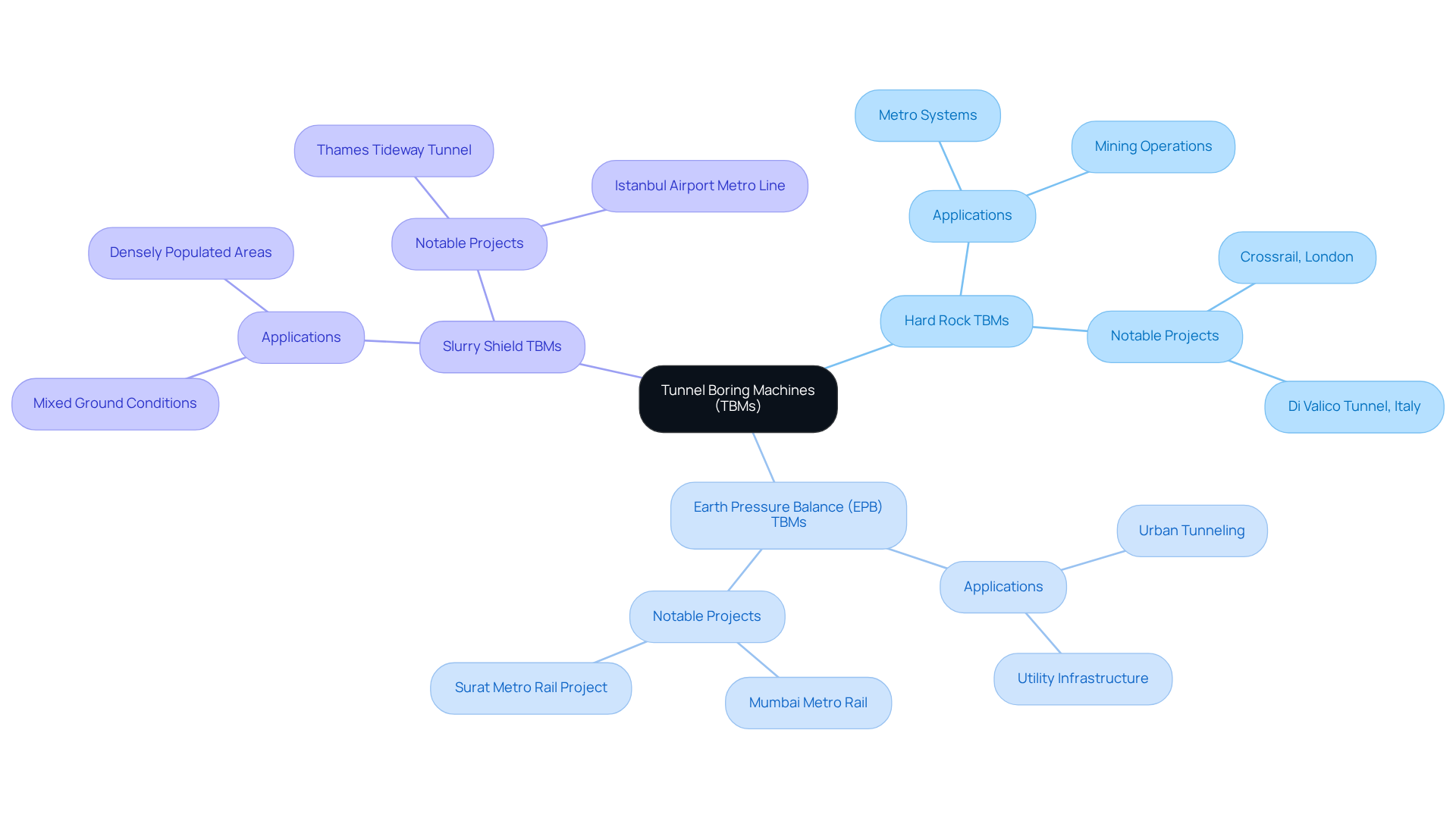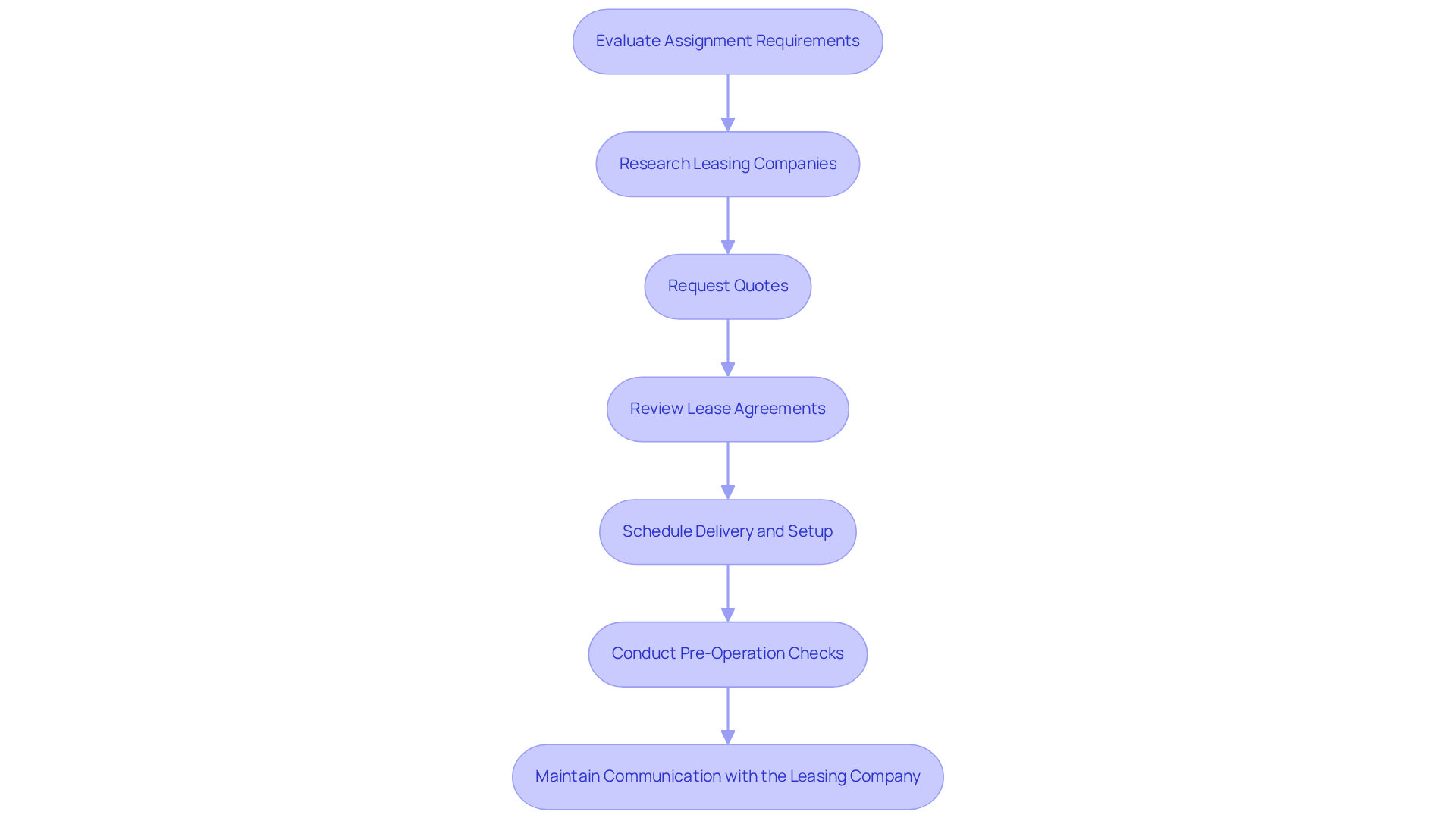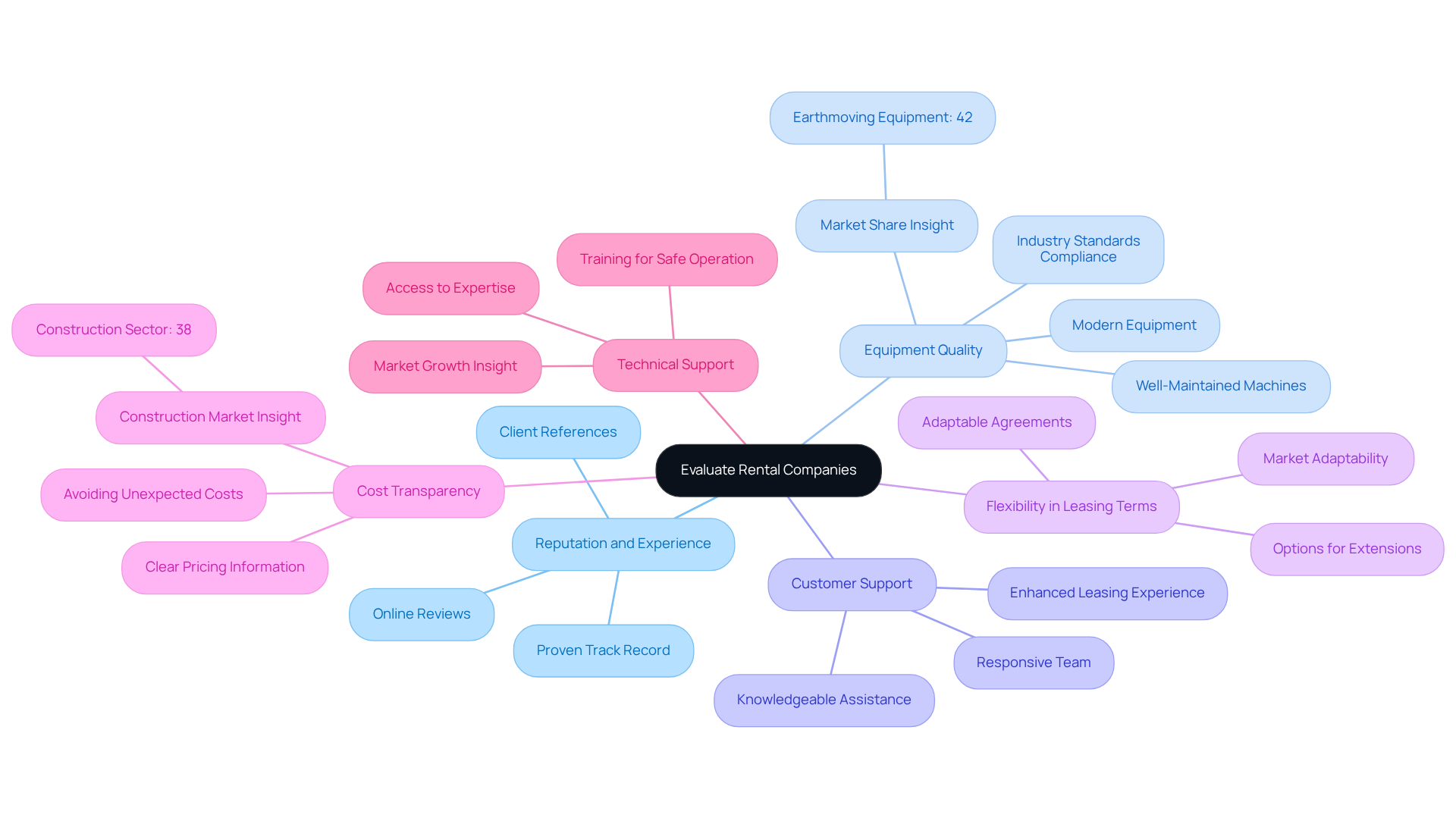Overview
To rent a tunnel boring machine (TBM) effectively, it is essential to follow a structured process. This process begins with evaluating project requirements, which sets the foundation for a successful rental experience. In addition, researching reputable leasing companies is crucial to ensure you partner with a reliable provider. Throughout the rental period, maintaining open communication with your rental partner is vital for addressing any concerns that may arise.
Choosing the right type of TBM tailored to specific soil conditions and project needs cannot be overstated. The equipment's performance significantly impacts project efficiency and success. Furthermore, key factors such as equipment quality, customer support, and cost transparency should guide your selection process. By prioritizing these elements, you can secure a rental partner that meets your expectations and project requirements.
Ultimately, the right TBM can make all the difference in your project's outcome. Engage with a trusted rental company today to explore your options and ensure you have the best equipment for your needs. Don't hesitate—take the first step towards a successful project by reaching out to a reputable TBM rental provider now.
Key Highlights:
- Tunnel boring machines (TBMs) are crucial for excavating tunnels in various soil and rock types, vital for infrastructure projects like metro systems.
- The global TBM market was valued at approximately USD 6,390 million in 2022, with projected growth to USD 6,705.8 million in 2023, reflecting strong demand.
- Different TBM types include Hard Rock TBMs for solid rock, Earth Pressure Balance (EPB) TBMs for soft ground, and Slurry Shield TBMs for mixed conditions.
- Hard Rock TBMs are used in projects like London's Crossrail, while EPB TBMs are exemplified by Mumbai's Metro III corridor.
- The rental process for TBMs includes evaluating requirements, researching leasing companies, requesting quotes, reviewing agreements, scheduling delivery, conducting pre-operation checks, and maintaining communication with the leasing company.
- Key factors in choosing a rental company include reputation, equipment quality, customer support, flexibility in leasing terms, cost transparency, and technical support.
Introduction
Tunnel boring machines (TBMs) are at the forefront of modern infrastructure projects, playing a pivotal role in the excavation of tunnels that support everything from metro systems to underground utilities. The demand for these specialized machines continues to surge, making it essential for project managers to understand how to effectively rent a TBM to meet tight deadlines and specific excavation needs. However, with numerous options and considerations in the rental process, selecting the right machine and partner can be daunting.
This article provides a straightforward, step-by-step guide to navigating the complexities of TBM rentals, empowering readers to make informed decisions that enhance their construction projects.
Understand Tunnel Boring Machines and Their Applications
Tunnel boring machines (TBMs) represent specialized equipment essential for excavating tunnels through a variety of soil and rock types. Their significance is underscored in critical infrastructure projects, including metro systems, road tunnels, and underground utilities. The global TBM market was valued at approximately USD 6,390.0 million in 2022, with projections indicating growth to USD 6,705.8 million in 2023. This trend reflects a robust demand for TBMs, driven by ongoing infrastructure development initiatives.
Different types of TBMs cater to specific excavation needs.
-
Hard Rock TBMs are engineered for solid rock, employing powerful rotating cutters for efficient tunneling. These machines are prominently used in metro systems, exemplified by the Crossrail initiative in London, which facilitated the construction of extensive underground rail networks. Their reliability in challenging conditions makes them a preferred choice for many projects.
-
Earth Pressure Balance (EPB) tunnel boring machines excel in soft ground conditions. They maintain pressure to prevent collapse during excavation, making them vital in urban areas where ground stability is paramount. This segment is currently the fastest growing in the TBM market, showcasing the evolving landscape of TBM technology. The Mumbai Metro Rail Corporation’s 33.5 Metro III corridor exemplifies their successful application, highlighting their importance in modern tunneling.
-
Slurry Shield Tunnel Boring Machines are designed for mixed ground conditions, utilizing a slurry to stabilize the tunnel face. This innovative technology minimizes surface disruption, proving particularly beneficial in densely populated regions. As urban growth accelerates, the demand for such advanced TBMs is expected to rise, reinforcing their role in effective tunneling operations.
Understanding the specific applications of each TBM type is crucial for making an informed decision when you rent a tunnel boring machine for your project needs. This knowledge ensures efficiency and effectiveness in tunneling operations when you rent a tunnel boring machine. As advancements in design continue to improve operational efficiency and safety, the importance of TBMs in construction becomes increasingly clear. According to the IMARC Team, market reports emphasize the excellence and quality of data related to TBMs, further underscoring their critical role in infrastructure development.

Follow the Step-by-Step Rental Process for Tunnel Boring Machines
To rent a tunnel boring machine (TBM) effectively, follow these essential steps:
-
Evaluate Your Assignment Requirements: Begin by identifying the specific specifications of the TBM required based on your project's scope, including tunnel diameter, length, and soil conditions. For projects that necessitate excavation longer than 4 km, it is often essential to rent a tunnel boring machine. Understanding these parameters is crucial for selecting the right machine.
-
Research Leasing Companies: Next, look for reputable leasing firms that specialize in TBMs. Investigate their inventory, customer reviews, and service offerings. With the TBM market projected to grow at a CAGR of approximately 6.2%, it is vital to choose a company from which you can rent a tunnel boring machine that caters to your specific needs.
-
Request Quotes: Reach out to various leasing firms to obtain quotes. Ensure you fully comprehend the leasing terms, including duration, costs, and any additional fees. The Tunnel Boring Machine (TBM) and Services Market was valued at USD 21,290.40 Million in 2024, highlighting the importance of competitive pricing.
-
Review Lease Agreements: Carefully examine the lease agreements, paying close attention to insurance requirements, maintenance responsibilities, and liability clauses. This diligence will help you avoid any surprises later.
-
Schedule Delivery and Setup: Coordinate with the leasing company for the delivery of the TBM to your work site. Ensure that the setup is conducted by qualified personnel to prevent operational issues.
-
Conduct Pre-Operation Checks: Prior to commencing operation, perform thorough checks to ensure the TBM is in optimal working condition and adheres to safety standards.
-
Maintain Communication with the Leasing Company: Finally, keep in touch with the leasing company throughout the leasing period for ongoing support and maintenance needs. This proactive communication ensures that any issues can be promptly addressed, thereby minimizing downtime.
By following these steps, construction project managers can effectively navigate the process to rent a tunnel boring machine, ensuring they meet project timelines and requirements.

Evaluate Rental Companies and Choose the Right Partner
When evaluating companies to rent a tunnel boring machine (TBM), several key factors should guide your decision-making process.
-
Reputation and Experience: Opt for companies with a proven track record in the industry. Investigate online reviews and request references from previous clients to gauge reliability and service quality. As Kyle Clements, CEO of Quipli, points out, the leasing sector is evolving quickly, making it crucial to select a partner that can adjust to shifting needs.
-
Equipment Quality: Ensure the leasing company allows you to rent a tunnel boring machine that is well-maintained and modern, adhering to industry standards. If possible, check the equipment to verify its state and appropriateness for your task. Notably, the demand to rent a tunnel boring machine, which is part of earthmoving machinery, captures 42% of the construction equipment leasing market.
-
Customer Support: Evaluate the level of customer service offered. A responsive and knowledgeable support team can greatly enhance your leasing experience, particularly during essential phases of work. Companies that prioritize customer service are likely to see increased demand and loyalty.
-
Flexibility in Leasing Terms: Choose a company that provides adaptable leasing agreements customized to your project needs, including options for extensions or modifications as necessary. This flexibility is crucial in a market where construction timelines can shift unexpectedly.
-
Cost Transparency: Ensure the leasing company provides clear and detailed pricing information, including any additional fees for maintenance, transportation, or insurance, to avoid unexpected costs. Clarity in pricing is essential, particularly as the construction industry represents 38% of the equipment leasing market.
-
Technical Support: Verify if the leasing company provides technical assistance and training for those who rent a tunnel boring machine. This support can be invaluable for your team, ensuring safe and efficient operation throughout the leasing period. As the market continues to expand, having access to technical expertise can prepare your endeavor for success.
By carefully considering these factors and staying informed about market trends, such as the projected growth of the global construction equipment rental market, you can choose a rental partner that aligns with your project goals and enhances overall operational efficiency.

Conclusion
Renting a tunnel boring machine (TBM) represents a pivotal step toward the success of any tunneling project. By grasping the various types of TBMs and their specific applications, project managers can not only select the right machine but also significantly enhance operational efficiency. This article has provided a comprehensive approach to navigating the rental process, from evaluating project requirements to choosing a dependable rental partner.
Key insights discussed underscore the necessity of understanding the unique characteristics of:
- Hard rock TBMs
- Earth pressure balance TBMs
- Slurry shield TBMs
Moreover, meticulous research when selecting a leasing company is paramount. The outlined step-by-step rental process emphasizes the importance of:
- Clear communication
- Thorough preparation
- Ongoing support
All of which serve to minimize downtime and ensure that project timelines are adhered to.
As infrastructure development continues to expand, the demand for effective tunneling solutions remains crucial. By implementing the strategies and considerations outlined, project managers can confidently secure a tunnel boring machine that aligns with their specific needs, ultimately contributing to the successful completion of essential construction projects. Engaging with reputable rental companies not only facilitates operational success but also cultivates a collaborative environment that fosters innovation in tunneling technology.
Frequently Asked Questions
What are tunnel boring machines (TBMs) used for?
Tunnel boring machines (TBMs) are specialized equipment essential for excavating tunnels through various soil and rock types, playing a critical role in infrastructure projects such as metro systems, road tunnels, and underground utilities.
What was the global market value of TBMs in 2022?
The global TBM market was valued at approximately USD 6,390.0 million in 2022.
What is the projected market value of TBMs in 2023?
The TBM market is projected to grow to USD 6,705.8 million in 2023.
What types of TBMs are there and what are their applications?
There are three main types of TBMs: Hard Rock TBMs, designed for solid rock, are used in projects like the Crossrail initiative in London; Earth Pressure Balance (EPB) TBMs, which excel in soft ground conditions, are vital for urban areas, as seen in the Mumbai Metro Rail Corporation’s Metro III corridor; Slurry Shield TBMs, used for mixed ground conditions, stabilize the tunnel face with slurry, minimizing surface disruption in densely populated regions.
Why is understanding the specific applications of each TBM type important?
Understanding the specific applications of each TBM type is crucial for making informed decisions when renting a tunnel boring machine, ensuring efficiency and effectiveness in tunneling operations.
How does the demand for TBMs relate to urban growth?
As urban growth accelerates, the demand for advanced TBMs, such as Slurry Shield TBMs, is expected to rise, reinforcing their role in effective tunneling operations.
What advancements are being made in TBM technology?
Advancements in TBM design continue to improve operational efficiency and safety, highlighting the growing importance of TBMs in construction and infrastructure development.




